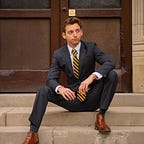Machiavellianism in the World of Peaky Blinders
What Birmingham’s notorious Thomas Shelby learned from philosopher Niccolò Machiavelli
The Birmingham Way
“You can change what you do, but you can’t change what you want.”
-Thomas Shelby
Debuted in 2013, Steven Knight’s award winning series “Peaky Blinders” tells the tale of a familial gang of Gypsies struggling to move up in 1919 Birmingham, England. In a time of unfettered capitalism, turf wars, and political chaos one thing is clear — it will take stone-cold ambition to get to the top.
Cillian Murphy plays Thomas Shelby, the Peaky Blinders’ ambitious leader. From the start, it is apparent that Thomas will stop at nothing to move up the ladder and escape his childhood poverty.
To accomplish this, Thomas adopts a unique leadership style and outlook on the world. Looking at Thomas’ plans, decisions, and interactions, there’s a clear influence from prolific 16th century philosopher Niccolò Machiavelli.
He achieves his idealistic goals with callous rule and a bloody red right hand.
Thomas Shelby: A Man of Virtue
Thomas Shelby is a man of many identities. Coming up parentless in a poor family, he was a kind, hard-working boy with sympathies for the socialist movement. Then came the war.
Like many other veterans, World War One changed Tommy. He returned to England hardened and awakened to life’s brutal realities. From then on, Tommy realizes he’ll neither advance his political goals nor help his family unless he takes things forcefully for himself.
Doing so, Tommy embodies the Machiavellian virtù: the characteristics that make up an effective leader.
Machiavellian Morality
“Politics have no relation to morals.”
-Niccolò Machiavelli
Machiavelli emphasized that men with virtù may have noble aims, but in a competitive world, they must sometimes exercise unethical means.
Tommy comes to terms with this when he is forced to shake hands with a man he literally describes as the devil — fascist politician Oswald Mosley. To prevent the emergence of a fascist movement in England, the Shelbys must temporarily ally with him.
In this decision-making process, Tommy enshrines the Machiavellian prince —noble in principle, but in practice he’ll briefly accommodate evil to attain a desired outcome.
Tommy is jeered in British Parliament for this choice, but it proves to be useful as he is promoted within the fascist movement. From here, he can undermine Mosley and redirect the party in a different way.
Machiavelli sees no difference between those who seek good and evil — statecraft is merely how one gains the power to implement their desires.
Love and Fear
“Men are driven by two principal impulses, either by love or by fear.”
-Niccolò Machiavelli
Machiavelli stated leaders should strike a fine balance between inaction and outright cruelty. Tommy understands that he must be fair but also maintain order and his own power.
When Michael Gray loses the Shelby Company Limited’s portfolio in the stock market crash, Tommy cracks down hard. He surveils him, treats him with scrutiny, and demotes him to a lower position. He strikes fear into his heart.
But once Tommy tolerates Michael again, he extends an olive branch by giving him another shot at his job and putting him in charge of a multi-million dollar opium export scheme. Can’t help loving your family.
Machiavelli’s idea is similar to the carrot and stick — you must provide positive and negative incentives — and Tommy has acute awareness of when and how to use it.
Flexibility
“If it were possible to change one’s nature to suit the times and circumstances, one would always be successful.”
-Niccolò Machiavelli
Immediately, the viewer sees Thomas Shelby‘s genius capacity to turn a bad situation in his favor — and quick. When plans go awry, Tommy truly thinks about how to adapt.
Machiavelli praises the ruler who doesn’t pull out the same bag of tricks whenever crisis emerges, but who thinks on his feet and turns failure to fortune.
In season 4, Arthur Shelby is severely wounded by one of Luca Changretta’s mobsters. Instead of advertising to the world the assassination failed, Tommy immediately tells everyone his brother died. Luca thinks his vendetta on the Shelby family is over and stops fighting, paving the way for Tommy’s victory.
The End Result
We have yet to see the outcome of Tommy’s Machiavellian techniques (especially given season 5’s cliffhanger) but doubtless it has achieved him an incredible amount. A successful criminal and legitimate business empire. A parliament seat. An incredible life for his family and the ability to shape the world.
A leader may not always use their virtù for good, or for evil. But Machiavelli’s insight can certainly yield results. As Thomas Shelby would say:
“I fucking beat them.”
Sources:
Honeycutt, K. (n.d.). Niccolò Machiavelli (1469–1527). Retrieved August 22, 2020, from https://iep.utm.edu/machiave/
Machiavelli, Niccolò. The Prince . Cambridge University Press, 1981.
Nederman, C. (2019, May 28). Niccolò Machiavelli. Retrieved August 22, 2020, from https://plato.stanford.edu/entries/machiavelli/
